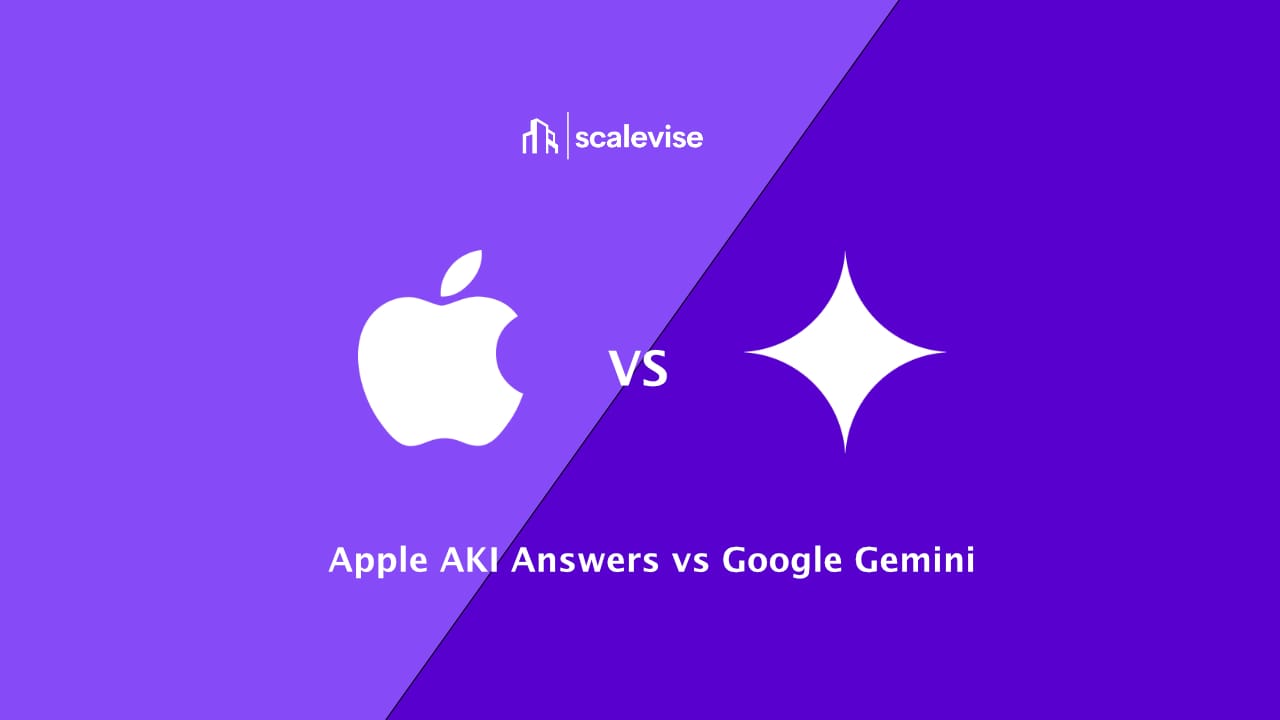Apple AKI Answers vs Google Gemini: Who Will Win the AI Assistant War?

In June, Apple announced Apple Intelligence (AKI) its long-awaited entry into generative AI, tightly integrated into iOS, macOS, and Siri. Alongside, the introduction of "AKI Answers", a ChatGPT-powered assistant embedded into Apple's ecosystem, signaled a shift in the personal AI landscape. But Apple isn’t the only one doubling down on smart agents. Google Gemini has already made inroads with AI tools for Android, Chrome, and Workspace.
Also See: Apple Intelligence vs Google Gemini
So which one leads the race and more importantly, what does this mean for your business?
In this article, Scalevise unpacks the differences, use cases, and strategic implications of Apple AKI Answers vs Google Gemini, especially for organizations exploring automation, AI adoption, and productivity gains.
What Is Apple AKI Answers?
Apple AKI (Apple Intelligence) is Apple’s AI framework, deeply embedded in its ecosystem. AKI Answers is the conversational interface that lets users query, summarize, write, or automate tasks across Apple devices powered in part by OpenAI’s ChatGPT.
Key capabilities:
- On-device language and image processing (with fallback to cloud-based ChatGPT)
- Summarizing documents, messages, and notifications
- Writing assistance in apps like Mail, Notes, and Safari
- AI-powered Siri enhancements
- Context-aware responses using personal data (calendar, mail, files) securely handled on-device
Apple differentiates itself with a privacy-first architecture, routing sensitive queries through "Private Cloud Compute" a hybrid approach that gives users control over what data leaves the device.
What Is Google Gemini?
Google Gemini is Google’s flagship multimodal AI model (formerly Bard), now integrated across:
- Android (Gemini replaces Assistant on Pixel and other devices)
- Google Workspace (Docs, Gmail, Sheets)
- Chrome and Search (with AI Overviews)
- Gemini Pro and Ultra APIs for developers
Gemini is known for:
- Fast performance and wide availability
- Deep integration into Google’s ecosystem
- Real-time information access (via Search)
- Developer tooling for custom use cases
Gemini also underpins AI Agents in Google Workspace, offering business automation through smart email drafting, meeting summaries, and task suggestions.
Apple vs Google: Strengths Compared
| Feature | Apple AKI Answers | Google Gemini |
|---|---|---|
| Ecosystem | iOS, macOS, iPadOS | Android, Chrome, Workspace |
| Data Privacy | Strong focus on local compute & privacy | Relies on cloud + account data |
| Personal Context | Deeply integrated with user data (on-device) | Moderate integration via Workspace |
| Multimodality | Limited in initial release | Native multimodal AI (text, image, code, etc.) |
| Business Use | Not business-ready yet | Gemini for Workspace is mature |
| Developer Tools | None yet | Gemini API, Google Cloud AI |
Strategic Implications for Businesses
Apple AKI is designed for consumers first, with business applications likely in future releases. It excels in personal assistance, summarization, and seamless integration for Apple-centric users.
Google Gemini, by contrast, is more enterprise-ready, with:
- APIs for custom AI workflows
- Admin tools for Workspace automation
- Full integration with enterprise tools like Google Cloud and Vertex AI
Key takeaway:
If your team is deep in the Apple ecosystem, AKI may eventually become a powerful productivity booster. But for most businesses looking to automate, scale, and optimize workflows today, Gemini offers more flexibility and maturity.
How Will This Affect AI Adoption in Organizations?
The battle between Apple and Google will accelerate AI adoption, especially at the employee level. As AI becomes more embedded in operating systems and everyday tools, companies will face new questions:
- Should we trust built-in AI assistants with business data?
- How do we control access to sensitive queries?
- Can we automate workflows across devices and services?
- Will our tech stack support both Apple and Google users?
At Scalevise, we’ve already helped organizations navigate this complexity by building custom middleware that connects internal tools, AI models, and user environments regardless of platform.
What Businesses Should Watch For
Here’s what forward-thinking companies should monitor:
1. AKI's Developer API
Apple hasn't released a public API for AKI yet. When it does, expect a surge in third-party productivity tools, similar to iOS Shortcuts or widgets.
2. Gemini Workspace Agent Expansion
Google is building agentic AI into its business apps like auto-generated agendas, live summarization, and smart replies. Expect more autonomous features soon.
3. Cross-platform Compatibility
Teams working with both Apple and Google users will need integration strategies that sync data, permissions, and workflows across platforms.
Conclusion
Apple AKI Answers is a bold vision with strong privacy foundations and a natural fit for Apple loyalists. Google Gemini is the more mature, flexible option for businesses serious about productivity and automation.
This isn’t just a platform war. It’s a sign that AI assistants are becoming native infrastructure not separate tools. The winners will be those who learn to orchestrate, secure, and embed these agents into business workflows now.
Scalevise Can Help You Stay Ahead
We help businesses turn AI potential into practical solutions. Whether you're exploring Gemini for automation, building your own AI agent, or preparing for Apple’s next AI leap Scalevise provides expert guidance and hands-on implementation.
➡️ Explore our AI resources: https://scalevise.com/resources/
📞 Contact us today: https://scalevise.com/contact
